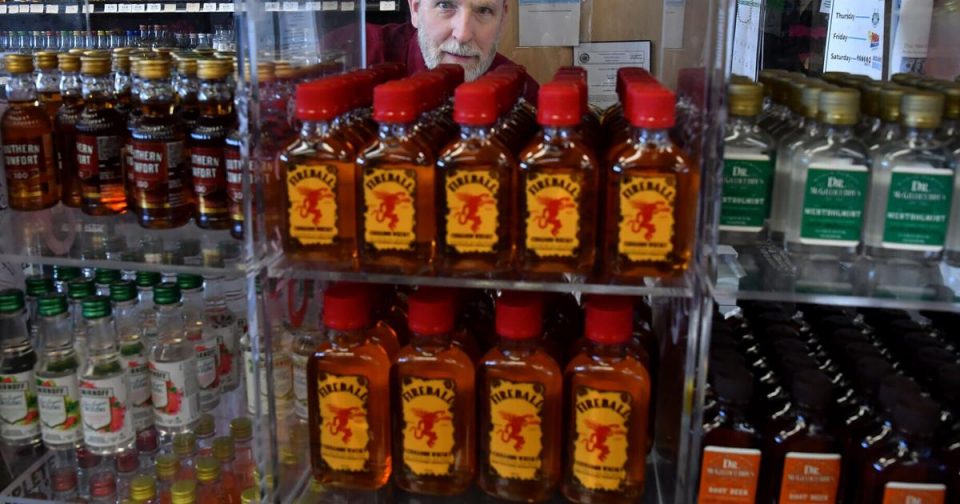MANSFIELD — Two town residents have submitted a citizens petition for the May 19 annual town meeting that would ban the sale of nip bottles, those small containers of liquor that are often are tossed alongside roads and walkways.
Specifically, the petition from Julie Jones and Sally Fehavari proposes to eliminate the sale of alcoholic beverages in plastic bottles smaller than 50 milliliters by local stores.
“It’s two-fold,” Jones said of the initiative at last week’s select board meeting. “First is the impact on the natural environment. I think we’re all aware, plastics don’t break down.
“Even if someone has great intentions and drinks it at home and puts it in their recycle bin, it’s still going to end up being trash.”
(Nip bottles are not accepted by Mansfield’s recycling program.)
“The other side of this is a reduction in drunk driving,” Jones said. “These nip bottles have been linked to drunk driving.”
If voters back the petition, the bylaw would take effect Jan. 1, 2023, thereby giving retailers time to get rid of existing stock, she said.
State legislators are again taking up a proposed expansion of the state bottle bill that would increase deposits from 5 to 10 cents. It would include nip bottles along with water and other bottles.
Some residents and town officials are questioning why the petitioners don’t just wait for legislative action.
But Jones said there has been a bill before the Legislature to add deposits to nip bottles for five years, without any approval.
“It would be wonderful,” she said. “But it would have to be state legislation. They first started talking about it in 2017. It keeps getting stalled.”
Wayne Smith, manager of Dubs’s Liquors and Fine Wines in Mansfield, attended the select board meeting and expressed his opposition to the proposal this week to The Sun Chronicle.
“Nips are a convenience for customers and they may just go elsewhere to buy them and still litter here. It’s not like out-of-towners come to Mansfield, buy nips, drink them, litter them, and then go home,” Smith said. “If you take nips away, you’re still going to have candy and chip wrappers, scratch tickets, cigarettes, and coffee cups along our beaches and roads.”
Litter problems can be addressed by steps such as various funding sources and wholesaler initiatives, he added.
“Nips provide a portion-controlled option for people who want to moderate their consumption,” Smith said. “Nips also provide an opportunity for people to sample expensive brands before purchasing, and are often used by people who want to purchase a small quantity of alcohol for cooking or baking.”
And there are more reasons liquor stores oppose such bans from an economic standpoint.
“When people buy nips they generally buy other products as well, which means we will also lose sales from additional items when people go elsewhere because we’ve stopped selling a product they like,” Smith said.
Nips account for up to 30% of a store’s sales and a ban could lead to employee layoffs, he added.
Select board member Steve Schoonveld said he agrees with the intent of the petitioners but hasn’t taken a stand yet.
“I’ve picked up plenty,” Schoonveld said of nip bottles.
State Sen. Paul Feeney, D-Foxboro, said an amended state bottle bill “has some momentum this session and I hope it sees the light of debate soon.”
“Everyone in and around town knows just how pervasive, and quite frankly how disgusting, the problem of nip bottles along the roads and throughout our neighborhoods has become. We have the opportunity to address this growing issue in our communities,” Feeney said. “A small deposit increase is a trade-off I’d make every day of the week to eliminate the piles of nips I see while traveling our district, and judging by the supportive calls I’ve received on this issue, many of our neighbors feel the same way.”
Attleboro Mayor Paul Heroux last year pushed for a ban on nip bottles, but after much opposition, city councilors voted against it last June.
Five Massachusetts towns –Wareham, Chelsea, Mashpee, Falmouth and Newton — have banned nip bottles.


